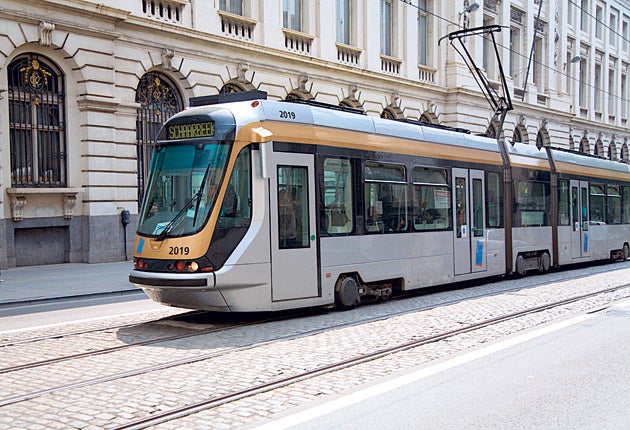John Lichfield: No thief can end this love affair
Notebook

I have always loved trams, and especially Brussels trams.
This is not surprising. I owe my existence to them. My father met my mother on a Brussels tram in 1945. One of my earliest memories is watching, at the age of four, a string of tram cars ascending the gentle incline of the Avenue de la Chasse in eastern Brussels.
When I moved to the Belgian capital in the early 1980s, my ancient Belgian Godmother sought to advise me on where I should live. I said that I would live anywhere so long as there was a tram line outside the window. She said that I could live anywhere except "chez les Flamands" (i.e. on the Flemish side of town).
At that time, most of the Brussels trams still looked like large upside-down bath-tubs with windows. They were painted in a dull shade of yellow, the colour of a tram-ticket.
Modern Brussels trams resemble urban runabouts from Star Wars. They are painted in canary yellow with blue doors, or in glittering silver or in eye-sight-threatening advertising liveries. I adore them all the same.
My love affair with the Brussels tram did, however, briefly falter the other day.
I arrived at the Gare du Midi to find that there was a tram strike. Nothing unusual about that. A large crowd gathered on the underground tram platform. We waited for 20 minutes. A scab tram finally arrived.
A man boarded ahead of me and then stopped, inexplicably, blocking the doorway. Another man pushed from behind. I shoved the man in front, gently. I felt my wallet disappearing, equally gently, from my trouser pocket.
I jumped off the tram in time to see the thief ascending the escalator. He looked down at me with an expression of mild curiosity. Would I give chase? No, of course I couldn't. He was twenty years younger than me and I had a wheely suit-case.
I have never been pick-pocketed before. It is an unsettling experience, as if part of your life had been stolen. There was only Euros 30 in the wallet. The credit cards were easily cancelled and replaced. But what of my first and only British driving licence, issued 40 years ago, complete with 1974 endorsement for driving a Morris Minor through Bolton, Lancs, with "dangerous parts and accessories"? I will never see that again.
The Gare du Midi in Brussels is a miserable place and a notorious den of pick-pockets. Crime has become a serious problem in Brussels. The large immigrant populations of Turks and Moroccans are invariably blamed.
I got a good look at my thief and a reasonably good look at his accomplice, the man who had blocked me. The thief was a respectable-looking white man in his late 30s. He had a beard but no moustache and a bland, anonymous face. You didn't need to be Hercule Poirot to deduce that he could only be a Belgian.
I still love Brussels trams. There is something amorous about the way that they shudder and squeal. My father, presumably, fell under the same spell in the autumn of 1945.
That other revolutionary, Vladimir Ilyich Lennon
On the subject of cross-European cultural influences, there has been a fascinating correspondence recently in the columns of The Irish Times. Vladimir Ilyich Ulyanov, better known as Lenin, spoke English, it appears, with a Dublin accent, or more specifically, "a Rathmines accent".
The great revolutionary never visited Ireland in his life. How, then, did he come to speak English with the accent of south-central Dublin?
After Lenin's death, the Soviets researched his early life and discovered that he learned English during his five visits to London between 1902 and 1911. He placed an advertisement in a newspaper offering to swap Russian lessons for English lessons. A man answered whose name was recorded only as "Mac-something". The Russian researchers assumed that he was Scottish.
Daltun O Ceallaigh has written to the Irish Times to put the record straight. In the mid-1970s, he explained, he had attended a talk given by Roddy Connolly, son of the Irish revolutionary James Connolly.
The younger Mr Connolly, since deceased, recalled meeting Lenin in Moscow in the early 1920s. They had conversed in English and the Soviet leader had, to his astonishment, spoken "with a Rathmines accent". The "Mr Mac-something" who had taught Lenin English must therefore have been a Dubliner.
It would be nice to imagine that Mr Ulyanov's revolutionary cover name was chosen by his unknown Irish friend and that "Lenin" was a Russianised version of "Lennon", or like the present Irish finance minister, "Lenihan". Stubborn historians insist, however, that Vladimir Ilyich was already known as Lenin before his first visit to London in 1902.
Let the French cheat if it makes them happy
European cultural collision, number 3. I wasflying out of Dublin airport at the weekendafter France (very luckily) beat Ireland atrugby. A large group of France supporterstried to push in half way down the embarkation queue.
An Irish passenger in front of me objected. "You can cheat on the rugby field," he said. "But you can't cheat here."
The French passengers, sullenly and with bad grace, allowed him to go ahead of them. They pushed in further down the queue instead.
I overheard one saying to his friend, without much of a smile: "We have the right to cheat. After all, we are French."
Quite right. The harmonisation of morality in Europe has gone too far. If the British refuse to give jail-birds the vote, the French have an inalienable right to queue jump.
j.lichfield@independent.co.uk
Join our commenting forum
Join thought-provoking conversations, follow other Independent readers and see their replies
Comments
Bookmark popover
Removed from bookmarks